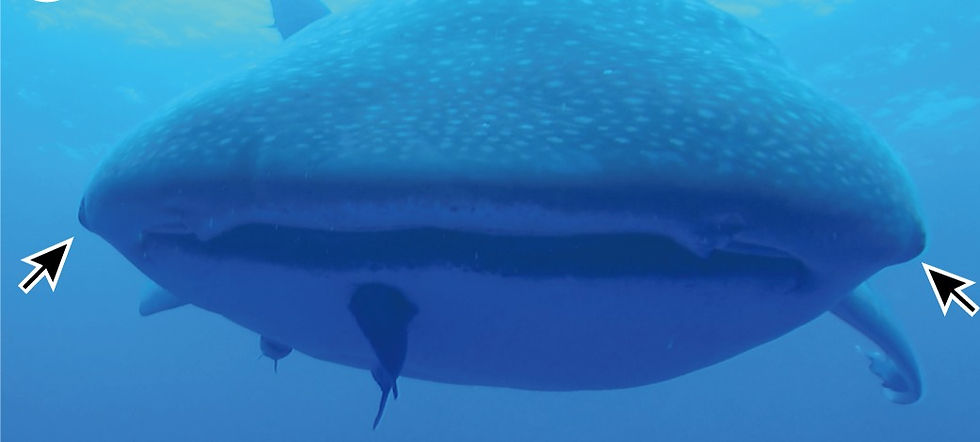An Eye for an Eye, a Tooth for a Tooth
- Sophie SharkSpeak Maycock

- Jul 15, 2020
- 3 min read
Updated: Dec 4, 2023
Whale sharks (Rhinocodon typus) are undeniably beautiful - that remarkably patterned skin, the graceful form, their gentle, ephemeral presence in the water. But there is one feature of whale sharks that scientists have long puzzled over... Whale sharks have eyes positioned in either side of the head, which project significantly from the "orbit" (aka eye-socket). They seem to really stick out! So, we wondered how whale sharks don't often suffer mechanical damage to the eyes when swimming amongst debris in the water. Well, scientists have recently made a truly remarkable discovery... whale sharks have teeth in their eyes! I know, this sounds like science fiction (or completely horrifying)... but it's true! Allow me to explain...

Not So Smooth
Whilst sharks look sleek and smooth from a distance, up close their skin is actually very rough. All sharks, including whale sharks, have modified teeth all over their bodies, called "dermal denticles", which form a skin of protective armour. Dermal denticles are basically tiny, hard scales, which lay as interlocking plates, oriented from nose to tail, to reduce drag when swimming through the water. They give the skin strength, whilst retaining flexibility and so are important for protecting the shark from parasites and from sharp rocks or coral (Tomita et al, 2020).
Dermal denticles are found in many different shapes and sizes in different areas of the body, and vary greatly between different species (to learn more, you can check out Taking the Rough With the Smooth).

*Eye Roll*
To date, no other shark species is known to have dermal denticles in their eyes. Instead, many other species of sharks have "nictating membranes" which, like an eyelid, can be drawn over the eye for protection. Where this is absent, some sharks, like the great white (Carcharodon carcharias), are able to roll the eye backwards, in order to shelter the delicate parts and expose the toughened back of the eyeball (Ridewood, 1899).
Whale sharks have previously been witnessed rolling their eyes, but a recent study has found that this is more pronounced than we previously thought. Not only can whale sharks roll their eye, but they can retract the eyeball back into the orbital socket to protect it from damage (Tomita et al, 2020).
Eyes Full of Teeth
Whilst studying how whale sharks move and retract their eyes, scientists came across the most startling discovery... sharks have dermal denticles in their eyes which also provide them protection from damage.
These denticles are different to those found across the skin of the shark, as they have an 'oakleaf-like' shape and differ in their surface texture. Yet, like other dermal denticles, these eye denticles are, in fact, modified teeth! Each eye denticle has a hardened surface, like tooth enamel, making it strong (Tomita et al, 2020).
Whale sharks have as many as 3,000 individual denticles arranged in a ring around their eye. This means that light can still enter the iris, so they can see, but the whole surface of the eye surrounding the iris is armoured. This protects the delicate ocular structures from damage if something strikes them (Tomita et al, 2020).
Blast From the Past
This is a fascinating finding, because no other sharks are known to have eye denticles, even those which are very closely related to the whale shark. However, several species of extinct sharks have been found to have similar eye armour. This suggests that eye denticles are unique to whale sharks today, but may have been prevalent amongst other sharks species millions of years ago (Tomita et al, 2020)

References
Ridewood WG (1899). On the eyelid-muscles of the carchariidae and Scyllium: a contribution to the morphology of the nictitating membrane of sharks. Journal of Anatomy and Physiology, 33:2, 228. Access online.
Tomita T, Murakumo K, Komoto S, Dove A, Kino M, Miyamoto K & Toda M (2020). Armored eyes of the whale shark, PLoS One, DOI: 10.1371/journal.pone.0235342. Access online.
By Sophie A. Maycock for SharkSpeak













amazing